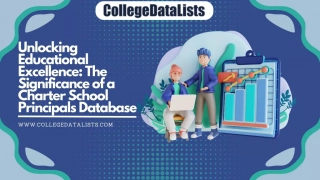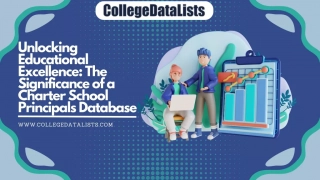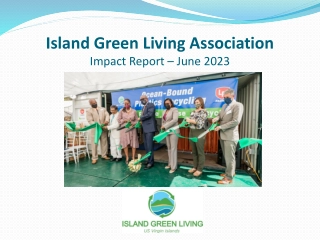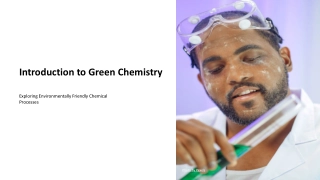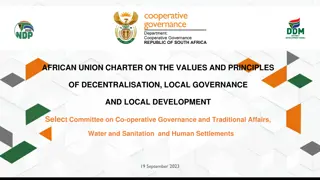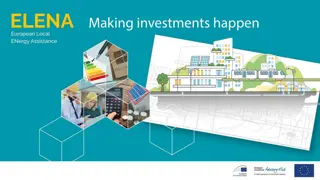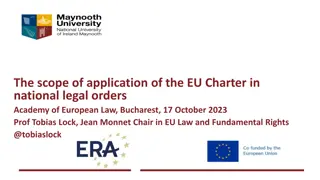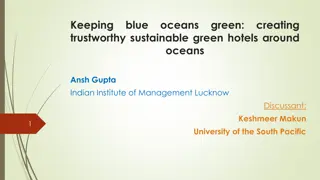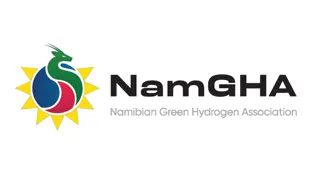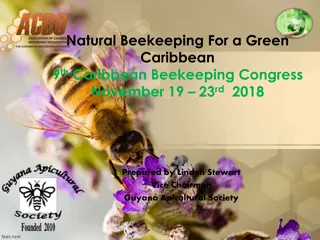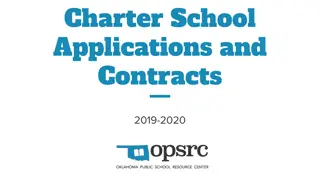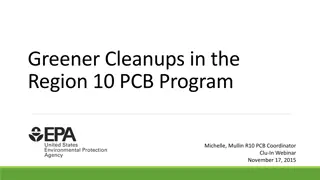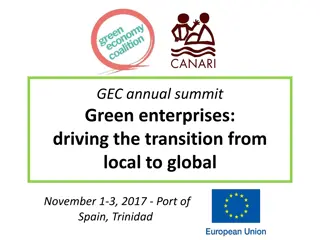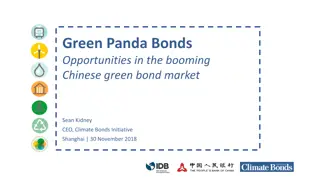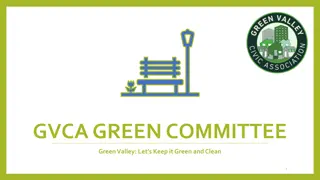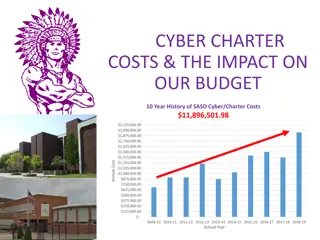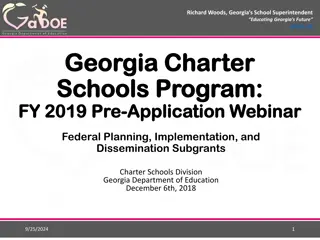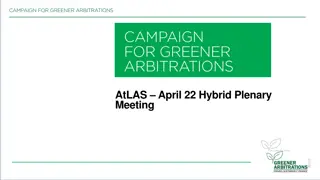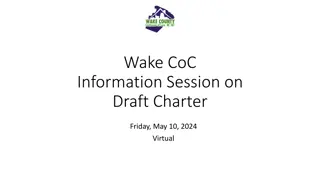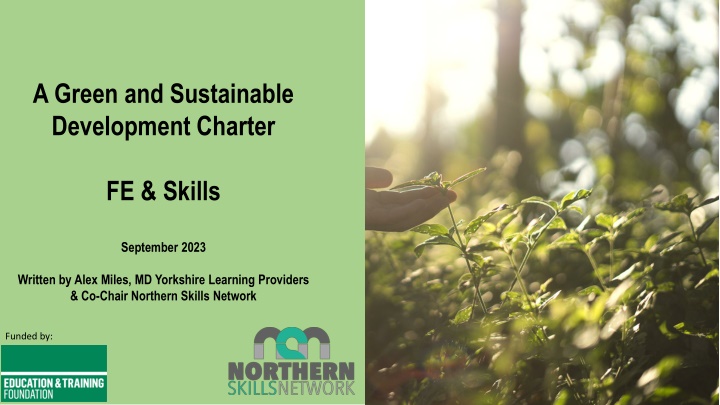
Green & Sustainable Development Charter for Greener Future September 2023
In response to the need for sustainability in education, the charter emphasizes embedding green practices in curriculum development, promoting sustainability, and fostering a culture of environmental responsibility in FE & Skills organizations. By committing to this initiative, institutions aim to reduce their environmental impact, incorporate green skills into learning, and work towards a greener future.
Download Presentation

Please find below an Image/Link to download the presentation.
The content on the website is provided AS IS for your information and personal use only. It may not be sold, licensed, or shared on other websites without obtaining consent from the author. If you encounter any issues during the download, it is possible that the publisher has removed the file from their server.
You are allowed to download the files provided on this website for personal or commercial use, subject to the condition that they are used lawfully. All files are the property of their respective owners.
The content on the website is provided AS IS for your information and personal use only. It may not be sold, licensed, or shared on other websites without obtaining consent from the author.
E N D
Presentation Transcript
A Green and Sustainable Development Charter Greener FE & Skills Fairer September 2023 Written by Alex Miles, MD Yorkshire Learning Providers & Co-Chair Northern Skills Network Funded by: Fairer Stronger OFFICIAL
Institutional Change Apprentices leading positive change As part of the response to greenup the curriculum, FE & Skills organisations have an important role to play in raising the profile of sustainability across the industries they support through projects and activities apprentices and learners undertake. FE Sector response Embedding in the curriculum FE & Skills organisations have a responsibility to teach learners about sustainability but to commit to becoming truly sustainable institutions and for all to be working towards net zero by 2030. In order to meet local and national net- zero goals, education for sustainable development needs to be embedded and promoted into all areas of the curriculum. By doing this we will better equip our learners for their future learning, careers and life choices. Through building successful long-term relationships with key sector partners that support green, circular and sustainable development, we commit to provide a platform to learn, share and develop this agenda. Resources such as: AoC Green College Commitment Climate Action Roadmap for FE Colleges UNESCO 17 Goals UNESCO ESD Roadmap Ten Point Plan for a Green Industrial Revolution By working collaboratively and playing our part we can ensure sustainable development across the region is given the priority and recognition it requires to be impactful. This pledge will offer the skills system a clear voice to influence local policy and funding decisions and support the raising of quality standards and curriculum development through sharing of good practice. As FE and skills organisations commit to embedding, promoting and contextualising sustainability matters into the curriculum, we will build a bank of resources and case studies that support the wider skills community and share activities that lead to greater knowledge and understanding of sustainability issues both for employers and learners. More esources & supporton embedding approaches and a how to guide is available on the Padlet. By identifying sustainability projects and activities, learners and apprentices will gain greater knowledge and a deeper understanding of the issues that affect young people and adults. FE & Skills providers need to listen to that voice, allow learners to generate ideas and ultimately influence and lead positive change for their future. Examples of projects and helpful tips & prompts are available on the Padlet. will help the sector implement sustainability strategies and governance frameworks leading to greener institutions. More guides & signposting available on the Padlet. OFFICIAL
A Green & Sustainable Development Charter Aim: To provide FE & Skills organisations with an opportunity to enhance their response in supporting green and sustainable development by adopting green skills, circular economy and sustainability practices as part of operational and curriculum development. By committing to this charter you agree to: Identifying, monitoring, sharing & reducing the environmental impact of our organisation whilst striving to continually improve our environmental performance as an integral part of our business strategy and operating methods, with regular review points and specific targets & to showcase impact in this area via ongoing meetings & events Utilising the resources available, including the EAUC Climate Action Roadmap, AoC Green College Commitment and UNESCO Education for Sustainable Development 2030 Roadmap to embed, promote and contextualise green, regenerative and sustainable approaches into the curriculum, encouraging discussion and debate amongst students, staff and external stakeholders and provide resources and upskilling on this agenda. Identifying and sharing projects, workplace activities, resources and case studies that lead to greater knowledge and understanding of sustainability issues both for the employer and the learners, building a bank of resources and case studies that support the wider skills community and that empowers local businesses and training organisations to become net-zero. Building long-term relationships with partners and other networks across the region that support the skills sector s green and sustainable development needs and provide a platform to learn, share and develop this agenda including the opportunity to offer a clear voice to influence skills policy around sustainability and support the raising of quality standards, curriculum development and the introduction of new greener standards and qualifications. Signed by: On behalf of: Published on: OFFICIAL
A Green & Sustainable Development Charter To support the commitment of this charter a resource bank has been produced covering the 4 pillars of the charter. The resources can be found on the ETF website and on the Northern Skills Website or contact the project lead directly. Alex.miles@wylp.org.uk www.northernskillsnetwork.co.uk - www.et-foundation.co.uk The resource bank includes: Provider support Padlet - https://padlet.com/askresources21/nsn-gsd-padlet-wmuiprx41ie7kk30 Employer support Padlet - https://padlet.com/askresources21/green-sustainable-apprenticeships-for-employers-hn8pgcmyjobgwiyz Institution Health check providing a self-assessment type approach to reviewing and developing operational, teaching & learning, people and partnerships responses and action plans. Also green focused folio s on key terms to support internal policy development. Glossary of terms - Supporting the understanding of key terms for practitioners and learners / apprentices Embedding guidance A how to guide with tips to supporting the development of mapping sustainable development into apprenticeship standards. Plus, workbooks for apprentice activities in the workplace, helpful prompts for discussions at progress reviews, examples of apprentice & learner projects, a dedicated guide for Health & Social Care apprenticeships and a provider toolkit for embedding green. Access to expert & specialist presentations to support the FE & Skills sector in further enhancing their institutional and curriculum response to sustainable development a range of experts and specialist guest were invited to join the projects community of practice, the resource bank includes all of their presentations and tips to support apprentice and learner development OFFICIAL

